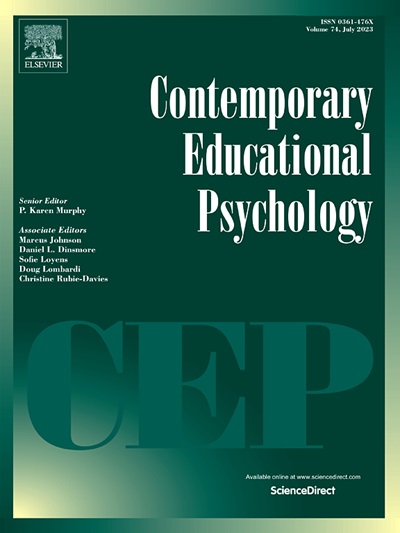Insider research: Reflexivity, responsibility, and community-informed approaches
IF 3.8
1区 心理学
Q1 PSYCHOLOGY, EDUCATIONAL
引用次数: 0
Abstract
Despite advancements in educational psychology research that have amplified the diverse experiences and development of Black, Indigenous, and People of Color (BIPOC) in educational spaces, BIPOC scholars continue to face challenges in the change-resistant landscape of academia and educational psychology. One prominent issue is the lack of methodological frameworks that consider the lived realities of BIPOC participants and the positionality of BIPOC researchers. As Latina/o researchers, we collaboratewith our communities to reconstruct existing paradigms and deconstruct deficit perspectives. We provide alternatives in educational psychology, addressing the issue of race-neutral solutions that often default to white middle-class students as the norm. We contend that researcher reflexivity and responsibility to one’s community allow participants and researchers to present their whole selves beyond existing protocols, norms of engagement, and temporal research participant expectations. Our ongoing qualitative research study examines how Latina community college transfer students at selective universities in California interact with support networks and develop a sense of community. Our team adopts a reflexive and relational methodology for engaging in insider research. While this focuses on the experiences of Latina college students, our framework aims to motivate BIPOC researchers conceptualize culturally relevant methodologies, recognizing that we do not aim to offer a one-size-fits-all approach. This methodology centers researcher(s) positionality and researcher-participant connections, allowing us to better calibrate participant responses and capture lived experiences beyond the confines of existing theories and frameworks.
内部研究:反身性、责任和社区知情方法
尽管教育心理学研究的进步放大了黑人、土著和有色人种(BIPOC)在教育领域的不同经历和发展,但BIPOC学者在学术界和教育心理学的变化阻力中继续面临挑战。一个突出的问题是缺乏考虑BIPOC参与者的生活现实和BIPOC研究人员的立场的方法框架。作为拉丁裔/非拉丁裔研究人员,我们与我们的社区合作,重建现有的范式,解构赤字视角。我们提供教育心理学的替代方案,解决种族中立的解决方案问题,这些解决方案通常默认为白人中产阶级学生作为规范。我们认为,研究人员的反身性和对社区的责任使参与者和研究人员能够超越现有的协议、参与规范和时间研究参与者的期望,展示他们的完整自我。我们正在进行的定性研究调查了加州精选大学的拉丁裔社区学院转学生如何与支持网络互动并培养社区意识。我们的团队采用反身性和关联性的方法进行内部研究。虽然这侧重于拉丁裔大学生的经历,但我们的框架旨在激励BIPOC研究人员将文化相关的方法概念化,认识到我们的目标不是提供一种通用的方法。这种方法以研究人员的立场和研究人员与参与者的联系为中心,使我们能够更好地校准参与者的反应,并超越现有理论和框架的限制,捕捉生活经验。
本文章由计算机程序翻译,如有差异,请以英文原文为准。
求助全文
约1分钟内获得全文
求助全文
来源期刊

Contemporary Educational Psychology
PSYCHOLOGY, EDUCATIONAL-
CiteScore
16.50
自引率
3.90%
发文量
74
期刊介绍:
Contemporary Educational Psychology is a scholarly journal that publishes empirical research from various parts of the world. The research aims to substantially advance, extend, or re-envision the ongoing discourse in educational psychology research and practice. To be considered for publication, manuscripts must be well-grounded in a comprehensive theoretical and empirical framework. This framework should raise critical and timely questions that educational psychology currently faces. Additionally, the questions asked should be closely related to the chosen methodological approach, and the authors should provide actionable implications for education research and practice. The journal seeks to publish manuscripts that offer cutting-edge theoretical and methodological perspectives on critical and timely education questions.
The journal is abstracted and indexed in various databases, including Contents Pages in Education, Australian Educational Index, Current Contents, EBSCOhost, Education Index, ERA, PsycINFO, Sociology of Education Abstracts, PubMed/Medline, BIOSIS Previews, and others.
 求助内容:
求助内容: 应助结果提醒方式:
应助结果提醒方式:


